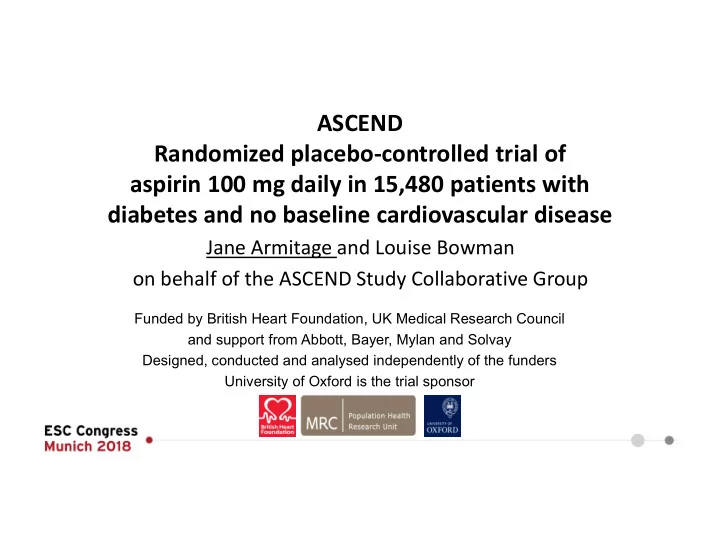

ASCEND Randomized placebo-controlled trial of aspirin 100 mg daily in 15,480 patients with diabetes and no baseline cardiovascular disease Jane Armitage and Louise Bowman on behalf of the ASCEND Study Collaborative Group Funded by British Heart Foundation, UK Medical Research Council and support from Abbott, Bayer, Mylan and Solvay Designed, conducted and analysed independently of the funders University of Oxford is the trial sponsor
Background Aspirin and cardiovascular disease • Aspirin use is well established in secondary prevention of cardiovascular disease • Diabetes is associated with increased cardiovascular risk but it is unclear whether aspirin should be routinely prescribed to prevent a first cardiovascular event Aspirin and cancer • Post-hoc analyses of selected randomized trials of aspirin suggest reductions in the risk of cancer, particularly gastrointestinal cancers, with effects apparent after about 3 years
ASCEND trial design Eligibility: Age ≥ 40 years, any DIABETES and no baseline cardiovascular disease Participants: 15,480 UK patients Factorial randomization: Aspirin 100 mg daily vs placebo (& to omega-3 fatty acid supplements vs placebo) Follow-up: Mean 7.4 years, >99% complete for morbidity and mortality Adherence: Average difference in anti-platelet use between groups 69% ASCEND Study Collaborative Group. Am Heart J 2018;198:135-144
Baseline demographics (N=15,480) Characteristic Aspirin Placebo Age, years 63 63 Male 63% 63% Type 2 diabetes 94% 94% Diabetes duration, median years 7 7 Hypertension 62% 62% Statin use 76% 75% Body Mass Index, kg/m 2 31 31 Glycated haemoglobin, mmol/mol 55 (7.2%) 55 (7.2%)
Key outcomes Primary efficacy outcome: Serious Vascular Event (SVE) Non-fatal myocardial infarction, Non-haemorrhagic stroke or transient ischaemic attack, or Cardiovascular death, excluding any intracranial haemorrhage Primary safety outcome: Major bleed Intra-cranial haemorrhage, Sight-threatening eye bleed, Serious gastrointestinal bleed, or Other serious bleed Key secondary outcomes : i) SVE or any revascularization (pre-specified for subgroup analyses) ii) Gastrointestinal tract cancer
Effect of aspirin on cancer Aspirin Placebo Rate Ratio Gastrointestinal tract 157 (2.0%) 158 (2.0%) 0.99 (0.80-1.24) Other gastrointestinal* 87 (1.1%) 82 (1.1%) 1.06 (0.78-1.43) Respiratory 101 (1.3%) 103 (1.3%) 0.98 (0.74-1.29) 332 (4.3%) 294 (3.8%) 1.13 (0.97-1.32) Genitourinary Haematological 88 (1.1%) 86 (1.1%) 1.02 (0.76-1.38) Breast 97 (1.3%) 96 (1.2%) 1.01 (0.76-1.34) Melanoma skin 50 (0.6%) 59 (0.8%) 0.85 (0.58-1.23) Any cancer 897 (11.6%) 887 (11.5%) 1.01 (0.92-1.11) * Hepatobiliary and pancreas
Effect of aspirin on Serious Vascular Events 20 Aspirin Placebo 658 (8.5%) 743 (9.6%) Participants with Event (%) 15 Rate ratio 0.88 (0.79-0.97) P=0.01 Placebo 10 Aspirin 5 0 0 1 2 3 4 5 6 7 8 9 Years of Follow-up
Components of the primary efficacy outcome plus revascularization Aspirin Placebo (N=7740) (N=7740) Type of Event Rate Ratio (95% CI) no. of participants with events (%) Vascular outcomes Non-fatal myocardial infarction 191 (2.5) 195 (2.5) Non-fatal presumed ischaemic stroke 202 (2.6) 229 (3.0) Vascular death excl. intracranial haemorrhage 197 (2.5) 217 (2.8) Transient ischaemic attack (TIA) 168 (2.2) 197 (2.5) Any serious vascular event 658 (8.5) 743 (9.6) 0.88 (0.79–0.97) P = 0.01 Any arterial revascularization 340 (4.4) 384 (5.0) Any serious vascular event or revascularization 833 (10.8) 936 (12.1) 0.88 (0.80–0.97) P = 0.01 0.6 0.8 1.0 1.2 Aspirin Better Placebo Better
Effects of aspirin assignment on SVE or revascularization in different types of participant Aspirin Placebo Rate Ratio (95% CI) (N=7740) (N=7740) Baseline Characteristic no. of participants with events (%) Sex Men 573 (11.8) 658 (13.6) 0.86 (0.77–0.96) Women 260 (9.0) 278 (9.6) 0.92 (0.78–1.09) Weight at randomization (kg) <70 118 (13.1) 108 (11.4) 1.17 (0.90–1.52) ≥70 694 (10.4) 812 (12.3) 0.83 (0.75–0.92) 5-year vascular risk <5% 179 (5.7) 208 (6.6) 0.86 (0.71–1.05) ≥5% <10% 384 (11.7) 431 (13.2) 0.86 (0.75–0.99) ≥10% 270 (20.5) 297 (22.0) 0.94 (0.80–1.11) All 833 (10.8) 936 (12.1) 0.88 (0.80–0.97) 0.6 0.8 1.0 1.2 1.4 1.6 Aspirin Better Placebo Better
Effect of aspirin on major bleed Aspirin Placebo Absolute Type of Event (N=7740) (N=7740) Rate Ratio (95% CI) Difference (%) no. of participants with events (%) Major bleed Intracranial hemorrhage 55 (0.7) 45 (0.6) 0.1 Sight threatening eye bleed 57 (0.7) 64 (0.8) -0.1 Serious gastrointestinal hemorrhage 137 (1.8) 101 (1.3) 0.5 Other major bleed 74 (1.0) 43 (0.6) 0.4 Any major bleed 314 (4.1) 245 (3.2) 1.29 (1.09–1.52) 0.9 P = 0.003 0.5 0.7 1.0 1.0 1.5 2.0 Aspirin Better Placebo Better
Observed effects per 5000 person years of aspirin by vascular risk SVE/revasc Bleed SVE/revasc Bleed Less: 11 ± 14 More: 10 ± 8 Less: 6 ± 4 More: 3 ± 3 SVE/revasc Bleed Less: 13 ± 6 More: 9 ± 3 ± = Standard Error
Summary • Aspirin did not reduce the risk of gastrointestinal or any other cancer with no apparent effect emerging with longer follow-up • Aspirin significantly reduced the risk of serious vascular events but also significantly increased the risk of major bleeding • The absolute benefits from avoiding serious vascular events were largely counterbalanced by the increased risk of bleeding • There was no group in which the benefits clearly outweighed the risks
Effect of aspirin on major bleed 10 Participants with Event (%) Aspirin 5 Placebo 0 0 1 2 3 4 5 6 7 8 9 Years of Follow-up
Recommend
More recommend